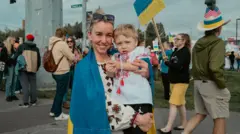“Putin should be imprisoned, yet he casually arrives in Alaska.”
Hanna Correa stands among countless Alaskans brandishing Ukrainian flags on the road to Anchorage.
“When I walked in and saw many Americans supporting us, it brought tears to my eyes,” she shares.
Ms. Correa, 40, left Ukraine in 2019 for love, and now the fate of her homeland might be influenced in her adopted city.
US President Donald Trump and Russian President Vladimir Putin are expected at Joint Base Elmendorf-Richardson, about 30 minutes away. Ukraine’s President Volodymyr Zelensky hasn’t been invited, which Ms. Correa finds “quite unfortunate.”
Protesting their visit is Christopher Kelliher, a 53-year-old military veteran and local.
“It’s appalling, makes you want a shower,” he remarks about the meeting.
“Putin shouldn’t be in our state or country. We have a fool in the White House ready to bow to him.”
The history between this region and Moscow gives Friday’s summit extra weight. The US bought Alaska from Russia in 1867 for $7.2m.
Critics dubbed it “Seward’s Folly,” referring to then-US Secretary of State William Seward, believing the territory a mere frozen wasteland. Later discoveries of rare minerals and oil and gas erased that image.
Ornate churches visibly symbolize Alaska’s Russian roots. Anchorage’s St Tikhon Orthodox Church has held three prayer days in anticipation of the leaders’ arrival.
Priest Nicholas Cragle, an American recently coming to Alaska after seven years in Russia, says the conflict is “especially painful and deeply felt” by parishioners.
“We’re hopeful this meeting leads to something… a culmination of this conflict,” Mr. Cragle states.
That sentiment is echoed by fishermen in creek beds on the town’s edge, drawn by some of the world’s finest salmon.
“I believe the summit’s a good idea, I wish Zelensky was here too… to resolve this,” says Don Cressley, from the Alaskan city of North Pole visiting on a fishing trip with his grandson.
He longs to end the war “because of the city’s destruction, making everyone homeless, taking away their food, supplies, their livelihood.”
Donald Trump, he believes, is doing an “excellent job” with ceasefire talks.
Although the US president frequently praises his relationship with Vladimir Putin, superpower tensions persist and are more sensitive here.
Russian military aircraft often appear near Alaska’s coast. In January, Canadian and American fighter jets responded to Russian jets sighted in the Arctic, as per North American Aerospace Defence Command.
Some Alaskans, living closer to Russia than Washington DC, feel a sense of unease.
“Even though the Cold War with Russia and the US is over, they’re often patrolling our airways,” Anchorage resident Russell Wilson remarks while fishing.
“If the president doesn’t act, we could be the next Ukraine.”
Yet some Alaskans dismiss Cold War hostilities as unlikely fantasy.
When asked if he’s worried about a Russian invasion, Army veteran Christopher Kelliher responds, “Not really, everyone in Alaska has a gun.”

